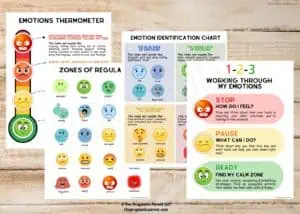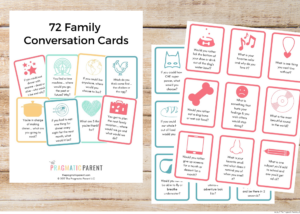Inside this post: From a very early age, parental affection can play a big part in a child’s behavior, as well as their ability to foster adult relationships.

How Love and Parental Affection Affect Child Development
When babies are born into this world, they rely entirely on their parents to take care of them. Their innocence and pure cuteness are all a parent needs to be convinced that they want to care for this child and protect them. In return for parental affection, a baby will shower you back with love.
While it may seem obvious that love goes a long way with your child, it’s not always an immediate response for parents. There are so many circumstances we don’t understand, such as a single parent whose every waking minute goes into the stress of supporting a family. Or, the parent who suffers from depression may not realize how their own child feels.
These circumstances don’t mean the parent loves the child any less. It just means that parental affection isn’t as easy as it seems. There are many small things you can do to nurture that parental bond with your children.
A parent’s affection can go a long way. Showing it to your children at a young age can have many positive implications well into adulthood. It’s that important!
How Affection Affects Child Development
Parents must shelter, cloth, feed, and protect their children. These are the basic responsibilities of being a parent. While that’s technically all a child needs on the surface, it’s also the responsibility of the parent to ensure the child feels safe.
The attachment theory relies heavily on measuring affection in child development. It believes that babies need an immediate emotional and physical bond with at least one caregiver as part of their healthy development. This ensures that they have a strong and secure attachment.
When a child feels safe and loved, they know that they can go out and explore the world. No matter what happens, they have somewhere to come back to. This makes them more likely to trust people, have an optimistic attitude, have greater self-confidence, and have the ability to replicate that bond with other people in their lives.
A study from Harvard backs this up. The study claims that the long-term effects of parental affection toward their children help them in adulthood. As adults, they become happier, have solid social relationships, feel self-acceptance, and are more likely to contribute to the community.
Effects of Lack of Affection in Childhood
The attachment theory also has something to say about when a child has a weak bond with their parents. If they feel insecure in their relationship, they’re afraid to leave and explore the world. Because if they do, they’re unsure whether they can return or not.
As a baby, there’s no innate reason to ever doubt a parent’s love and authority. What parents say must be true! This makes them instinctively sensitive as to how well they’re doing as babies. When loved, they can relax and just be a child learning to giggle at mom or crawl to their favorite toy.
But when a parent’s affection is lacking, the baby tries a lot harder to get that affection. Instinctively, the child feels in danger and that it can’t be cared for. They will smile and charm away all why wondering what’s wrong with themself. A baby wouldn’t even consider blaming the parents for lack of help.
As they grow older, this turns into a dislike of themselves. In their eyes, they failed the person they look up to and feel shame and self-hatred. They lack social skills and the ability to trust others. Studies show that adults who were disciplined harshly as children are more likely to suffer from anxiety, depression, and addiction.
This overall internalization from their early days can take a long time and work to undo. But, it’s certainly possible with the right help and support.
How to be a More Affectionate Parent
Affection may not be your first instinct, especially if your own parents had a hard time showing their affection. That can easily change in the next generation.
Here’s how you can nurture affection in your relationship with your children and what they desire the most from their caregiver.
Be Present
Whenever you’re around your child, it’s important to always be aware of them, even while multitasking. The more present you are, the easier it is to notice when a child seeks to connect with you. For a baby, this can be as simple as them making noises to get your attention or to answer right away when your child asks a question.
Limit daily distractions like scrolling on social media or answering work emails outside the office. Even practicing mindfulness can help you be more present for your children. When you are present, it signals that you pay attention to them. This can help them in the development of their communication skills, relationships, and social norms.
Anticipate their Needs
A parent knows their child better than they may even know themselves. You can help your child by giving them what they need before they even realize it. For instance, you can make a snack for them at the time of day they start to get hungry. Maybe you notice your child feels down, so you snuggle up with them on the couch.
However, avoid being a helicopter parent. Don’t help when the child is fully capable of doing things on their own. We still want to raise independent kids!
Make Time for Them
Every single day, each parent should have some one-on-one time with each of their kids. While things can get busy, it’s especially important to do this when the schedule is packed tight. It tells your kids that you prioritize them above other things, which is true parental affection.
Family time builds stronger bonds between children and parents. Take time to do something you know they love or find an activity that the two of you enjoy doing together.
It’s important for parents and children to have fun with each other!
Make Eye Contact
As simple as it may seem, eye contact lets your child know that they have your full attention. When you’re looking down at something or away from them when they speak, it tells your child that you’re thinking about other things. Eye contact helps to validate what they’re saying and let them know you’re being present. It’s also an important skill they need to develop from modeling.
Repeat their Words
While you’re listening and making eye contact, try to repeat what they’re saying when you can tell it’s really important. This is a strong listening skill that lets you know that you care about their feelings and understand what they’re saying means a lot. Repeating their words tells them you hear them loud and clear and validate your child.
Give them a Hug
10-second hugs are proven to have a positive effect on releasing endorphins and neurotransmitters. This is especially good when hugging chest to chest as the heart and stomach carry large parts of the nervous system. It helps to calm down the nervous system, so kneel for the hug if you have to!
Other types of physical touch are important too. Touch their arm in passing, lift them in the air, hold their hand while walking, and cuddle up to read a bedtime story.
Verbalize Parental Affection
Just saying I love you can go very far. Besides directly stating your affection, you can also express why you think they’re so special and what they do to earn your love (not that they need to!). When you can, reinforce their positive behaviors and emotions. This helps to build their self-esteem and feel safe and secure.
Support your Child
No matter what they do, you should be your child’s biggest cheerleader. Whether it’s one-on-one with your child or in front of others, remind them how proud you are of them and their accomplishments. Support whatever they want to do and who they want to be.
Change How you Measure Success
A big part of supporting your child also means changing your own expectations. Help them reach their personal goals and ensure they’re attainable. These goals should be important to them and not what you want them to be. Relieve any kind of pressure from them trying to measure up to what they think you want.
Teach them that mistakes are okay! Success isn’t always natural, and sometimes, you need help to get where you want to be.
Watch your Tone of Voice
Even if you’re truly listening or excited for your children, you need to ensure this is obvious. Parents need to be especially careful with sarcasm as most kids won’t understand it. Your words and how you say them need to match your emotions.
Make sure there’s always enthusiasm and passion in your voice, as well as love. The kids will notice it!
The Takeaway
After reading this, you’re probably wondering where you fall on the scale of parental affection and if you’re showing enough love to your children. While it’s important to look at yourself as a parent and ensure you’re doing everything you can, don’t criticize yourself if you’re not already doing everything listed above.
There are no measurements for a parent’s affection. Instead, the takeaway should be a general understanding that love and affection are important in shaping a child’s behavior and future relationships.






